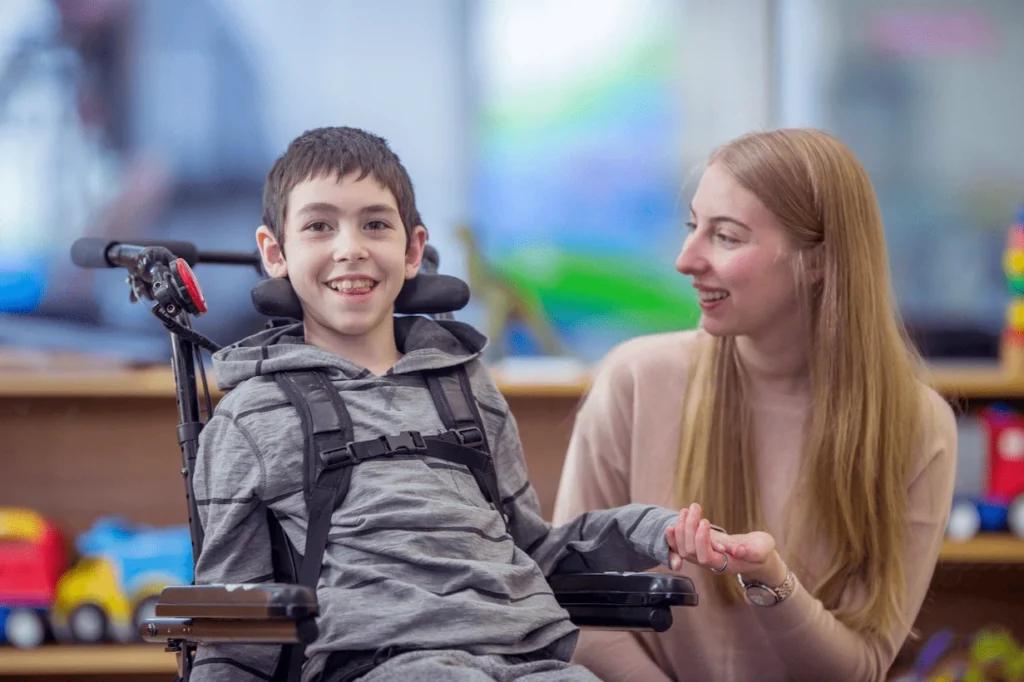
How the new PACE system works.
PACE is the new NDIS computer system, introduced in October 2023. All your NDIS-related information is stored here, including your contact details, goals, NDIS plan, funding and providers. It also connects to the updated myNDIS participant portal.
PACE is designed to improve the experience for people on the NDIS and providers by offering clearer and more consistent information on decision-making.
The PACE system also brings changes to how the NDIS works with participants and providers. All new NDIS Plans are now created in PACE. Existing plans will move across as they come up for renewal.
Creating your NDIS Plan – what’s changing.
With the new PACE system, there are some changes to how NDIS Plans are reviewed and created.
Participant check-in
About four months before your current plan ends, your NDIS contact (Local Area Coordinator/Early Childhood Partner/NDIA planner) will call you for a ‘participant check-in’. This is a chance to talk about how your plan is going and whether anything has changed.
They may ask you about:
- How you’re using your plan
- Your budgets and spending
- Reports from providers
- Any changes to your situation.
This helps the planner decide if you need a plan reassessment to develop a new plan or if you can continue with a similar plan.
If your new plan will be like your current plan.
You may not need a plan reassessment if:
- Your support needs haven’t changed much
- Only minor or no changes are needed
- Your plan still meets your needs
- Your supports still meet the NDIS funding rules.
In this case, your planner can use the check-in to develop your new plan. You won’t need to attend a plan meeting or provide as many reports.
Top tip: It’s important to confirm how you want to manage your plan (NDIA-managed, self manage, or plan managed) and provide your plan manager’s details if needed.
If your new plan needs to be different.
If you need more, less or different supports, you’ll need a plan reassessment. Your NDIS contact will explain the information and evidence you need and guide you through the process.
You will work with your planner to create your new plan. Once it’s ready, they will invite you to a meeting so you can review your new plan. New plans may be for up to three years, except for children under nine.
Top tip: Confirm your preferred plan management option and provide your plan manager’s name at this meeting if relevant.
Optional plan implementation meetings.
The NDIS offers optional ‘plan implementation meetings’ to help you get started with a new plan. These meetings will be with your NDIS partner and you can choose if you want to attend.
You can talk about:
- How to use your plan to make the most of budgets
- How to manage and pay for your supports
- Getting help with Service Agreements
- What to expect from check-ins.
What’s not changing?
- Your NDIS Plan will still be based on your individual needs
- The ‘reasonable and necessary’ test still applies
- Service Aagreements with providers are still recommended.

Other PACE-related changes.
Changes to support categories.
Under PACE there are some changes to how plans are structured. There are no changes to support item descriptions or the codes providers use to make claims.
Support categories are now grouped into four support types:
- Core
- Capacity building
- Capital
- Recurring (a new category for regular supports provided directly from the NDIS).
Changes to participant budgets.
Budgets are now allocated at the support category level in whole dollar amounts, giving you more flexibility.
- Core supports can be used flexibly across any category that is managed the same way (eg. all plan managed supports)
- Capacity Building and Capital supports may include stated supports that can only be used for items or services in that category.
Endorsing providers.
‘Endorsing’ a provider means giving them permission to access certain NDIS-related information about you and, if required, claim from your plan.
This can happen at a plan or reassessment meeting, or any time in between.
- Agency managed participants must endorse each provider they want to use
- Plan managed participants must endorse their plan manager. Plan managers can’t access funding from your plan or pay invoices until they are endorsed. How to endorse Leap in! as your plan manager. Endorsing other providers is optional.
- Self managed participants can choose to record providers under My providers.
Longer NDIS provider payment times.
To help reduce fraud and non-compliance, the NDIA has introduced changes to how claims are reviewed.
Provider payments and reimbursements are now taking longer as the NDIS is conducting more thorough reviews of claims before releasing funds. This has added at least 24 hours to the usual payment turnaround times.
Overnight releases of funds by the NDIS will no longer occur.
- Most valid reimbursements and payments will be processed within 2 to 3 business days from the submission date to the NDIS
- More complex claims may take up to 10 days.
Please note: The Leap in! team processes your payments as soon as we receive them from the NDIS. The delays are due to the new NDIS claims review process.